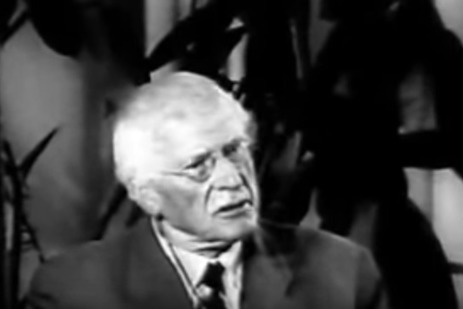 Your new post is loading...
 Your new post is loading...
Here’s an extraordinary film of the great Swiss psychologist Carl Gustav Jung speaking at length about some of his key contributions to psychology. Jung on Film (above) is a 77-minute collection of highlights from four one-hour interviews Jung gave to psychologist Richard I. Evans of the University of Houston in August of 1957. In “Sitting Across From Carl Jung,” an article for the Association of Psychological Science, Evans explains
For decades following World War II, the world was left wondering how the atrocities of the Holocaust could have been perpetrated in the midst of—and, most horrifically, by—a modern and civilized society. How did people come to engage in a willing and systematic extermination of their neighbors? Psychologists, whose field had grown into a grudgingly respected science by the midpoint of the 20th century, were eager to tackle the question. In 1961, Yale University’s Stanley Milgram began a series of infamous obedience experiments. While Adolf Eichmann’s trial was underway in Jerusalem (resulting in Hannah Arendt’s five-piece reportage, which became one of The New Yorker magazine’s most dramatic and controversial article series), Milgram began to suspect that human nature was more straightforward than earlier theorists had imagined; he wondered, as he later wrote, "Could it be that Eichmann and his million accomplices in the Holocaust were just following orders? Could we call them all accomplices?" or decades following World War II, the world was left wondering how the atrocities of the Holocaust could have been perpetrated in the midst of—and, most horrifically, by—a modern and civilized society. How did people come to engage in a willing and systematic extermination of their neighbors? Psychologists, whose field had grown into a grudgingly respected science by the midpoint of the 20th century, were eager to tackle the question.
Dear Men: So you think you want a ‘strong, independent woman’
jessicapsych Abuse, Feminism, Psychology, Sexism, Sexual January 4, 2020 10 Minutes So you think you want a ‘strong, independent woman’.
Written by Dr Jessica Taylor
4th January 2020
This blog is written for men, talking directly to men. Men who have an interest in women (whether heterosexual or bisexual).
Even more specifically, the men who say that they want a strong, independent woman. The men who find powerful, determined women sexy.
Splitting, dissociation and oppression In a previous piece on the embodied manifestations of racism, I put splitting at centre of the reproduction of oppression, inequality and racial violence. I posit that splitting allows people racialised as white; within white supremacist contexts, to dissociate from the harm and pain they cause and thus, to continue to reproduce it, blissfully. Splitting is often described as polarised or binary thinking but, the essence to remember here, is that the defence helps us manage conflicting emotional states or information we cannot integrate, enabling us to thus distance ourselves from those aspects we find irreconcilable with some perceptual entity, often ourselves or the world.
Helpful kids are happy kids: Pitching in with household jobs builds confidence and gives children a sense of belonging, psychologists say. Sisters Angela, 12, Gelmy, 9, and Alexa Natali, 4, know this well. Since they were toddlers, their mom has encouraged them to help around their home in a village near Valladolid, Mexico. Adriana Zehbrauskas for NPR. Back in the early 1990s, psychologist Suzanne Gaskins was living in a small Maya village near Valladolid, Yucatán, when she struck up a conversation with two sisters, ages 7 and 9.
Loneliness is a problem of epidemic proportions, affecting millions from all walks of life. But while its roots are complex, remedies may be within reach. In the world of Peanuts, Charlie Brown once visited Lucy's psychiatry booth and asked, "Can you cure loneliness?"
"For a nickel, I can cure anything," Lucy said.
"Can you cure deep-down, black, bottom-of-the-well, no-hope, end-of-the-world, what's-the-use loneliness?" he asked.
"For the same nickel?!" she balked.
Recently I was listening to Scott Barry Kaufman’s Psychology Podcast, which I highly recommend. Scott was speaking with James Clear, author of Atomic Habits, about the way we achieve growth in our personal and professional lives. Many of us see goal setting as the best approach to achievement, but Clear sees it differently. In his view, habits are the foundation of growth and change, in large part because they help us form our identity: “Every action you take is like a vote for the type of person you want to become.”
We are a group of individuals who teach, study and work in psychology and are trying to move the discipline away from its overwhelmingly White, Western bias (see how its biased here). We are directly influenced by the Why Is My Curriculum White movement.
We work at Leeds Beckett University and received a small grant (£,2,500) from our Centre for Learning and Teaching to highlight this Western*, White bias in our BSc and MSc Psychology courses in September 2016 (and again in September 2017). We know this bias is not exclusive to Leeds Beckett or even the UK, however. Therefore we have set up this website with the aim of signposting BME psychological and anti-racism work to begin to challenge this bias. We try to be mindful of the breadth and depth of racism in higher education and of the overwhelming need to do justice to BME psychological work.We know this website can only be one small step towards this.
Have you ever considered letting your students listen to hardcore punk while they take their mid-term exam?
Decided to do away with Power Point presentations during your lectures?
Urged your students to memorize more in order to remember more? If the answer is no, you may want to rethink your notions of psychology and its place in the learning environment.
Here are 35 critical thinking strategies, straight from the mind of Sigmund Freud.
For a long time, I resisted to-do lists. I wanted the flexibility. I felt that if I kept a list, it would tie me down to a particular set of tasks. Gradually, though, I came around. The busier my work life became, the more crucial it was to have some sort of running agenda on hand. Before long, I even started adding some of those items onto my weekly calendar. In other words, I'd reluctantly become a planner.
"In one and the same fire, clay grows hard and wax melts.” — Francis Bacon The most powerful way you can cope with stress or anxiety is to create a feeling of control.
|
Getting history across to young students is challenging enough, but what should a teacher do when actual history-making events happen on their watch? They have to be acknowledged, but to what extent do they have to be explained, even "taught"? Of the teachers who have turned history-in-the-making into a lesson, perhaps the most famous is Jane Elliott of Riceville, Iowa. On April 5, 1968, the day after Martin Luther King Jr.'s assassination, she divided her classroom of third-graders along color lines: blue-eyed and brown-eyed. On the first day she granted the brown-eyed students such special privileges as desks in the front rows, second helpings at lunch, and five extra minutes of recess. The next day she reversed the situation, and the blue-eyed kids had the perks.
This video talks about the relevance of forgiveness. The doer of the action will get the results of their action. That is the law of Cause and Effect. Forgiveness does not change that. Forgiveness unburdens the person who has been hurt by the action from carrying the hurt. They are able to get release from that hurt and pain. Forgiveness is the ultimate art of acceptance & moving on.
The bad apple fallacy This week-end I wrote a short Twitter thread attempting to apply the group analytic concept of location of disturbance to the current political context in the U.K. Principally, I was arguing that when controversial political figures like Johnson known for their racism get to power, we are quick to regard them as individual political mishaps rather than as manifestations of structural or collective configurations and dynamics. This is the logic of the bad apple theory which has been used from time immemorial, to distance ‘ourselves’ from those violent systems, we’re all a part of.
‘Let me tell you what it feels like to stand in front of a white man and explain privilege to him. It hurts. It makes you tired. Sometimes it makes you want to cry. Sometimes it is exhilarating. Every single time it is hard. Every single time I get angry that I have to do this, that this is my job, that this shouldn’t be my job. Every single time I am proud of myself that I’ve been able to say these things because I used to not be able to and because some days I just don’t want to’ (McCleave-Maharawal, 2016)
Discovering racism My discovery of racism was quite a brutal one. I was perhaps 4 or 5 and had been playing with my sister and some of the kids from the neighbourhood in front of our Parisian banlieue tower block as was customary for poorer families during school holidays or week-ends. There was quite a few of us; 15 perhaps even more. Children of all backgrounds having fun, skipping, running around and laughing the summer afternoon away, still quite oblivious to the dire social deprivation we were accustomed to and, the hostility our existence in France, created. A White man erupted from a ground floor flat in the tower effing and puffing, clearly aggravated by the noise we were collectively making. After his rant, he ran directly toward my elder sister and pushed her from behind.
I've already put off writing this article for about a week. Ironic, considering it's about procrastination. New research has found that there's actually a difference between doers — the people who just get stuff done — and procrastinators — the ones who don't. In the study, published in the journal Psychological Science, researchers used magnetic resonance imaging (MRI) to study the brains of 264 men and women. Then they filled out a survey to analyse how impulsive or decisive they were. Participants were given a score for decision-related action orientation (AOD), which essentially divided them into doers or procrastinators.
You’d think that bullies would disappear after high school, but some people never grow out of being a great big jerk. They may not steal your lunch money anymore, but bullies can still harass you, put you down, and even undermine your work. Here are some tips for understanding and dealing with bullies, no matter how old you are.
The perception of having Albert Einstein's body may help unlock previously inaccessible mental resources, finds a new study. Following a virtual reality "Einstein" experience, participants were less likely to unconsciously stereotype older people while those with low self-esteem scored better on cognitive tests. Published in Frontiers in Psychology, the study suggests the way our brain perceives our body is surprisingly flexible. The researchers hope the technique will be useful for education.
Via THE OFFICIAL ANDREASCY
This topic was most voted for in this week’s poll at the moment of publication of this article was the theory of the Four Stages of Cognitive Development! This theory was devised by Jean Piaget, and mainly spoke about children. Though he was not the first person to be involved in child psychology, there is no denying that Jean Piaget’s contributions to this subfield of psychology have had immense influences. He did many things besides psychology, such as history and philosophy, and he got involved in children’s education, as he thought that was very important.
For decades following World War II, the world was left wondering how the atrocities of the Holocaust could have been perpetrated in the midst of—and, most horrifically, by—a modern and civilized society. How did people come to engage in a willing and systematic extermination of their neighbors? Psychologists, whose field had grown into a grudgingly respected science by the midpoint of the 20th century, were eager to tackle the question.
Is there someone in your life who consistently makes you feel like you are on an emotional roller coaster? Do you know a person who is friendly one day but sulks and withdraws the next? Does a family member or friend consistently procrastinate, postpone, stall, and shut down any emotionally-laden conversations? Are you sometimes that person? If you answered "yes" to any of these questions, chances are you may be interacting with a passive aggressive person or showing signs of passive-aggressive behavior yourself.
Drugs, coffee, television – they can all be described as 'addictive'. But when do they become a problem?
|
 Your new post is loading...
Your new post is loading...
 Your new post is loading...
Your new post is loading...





























